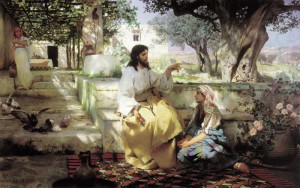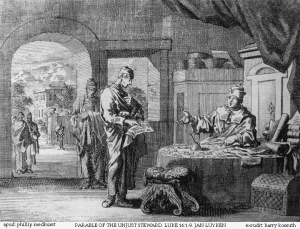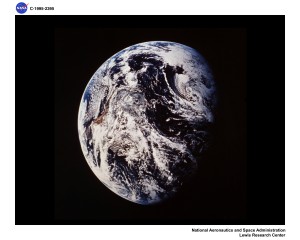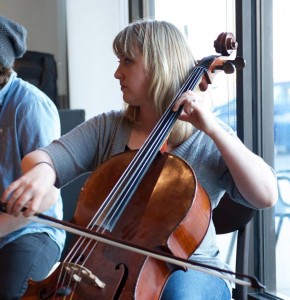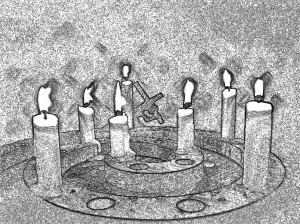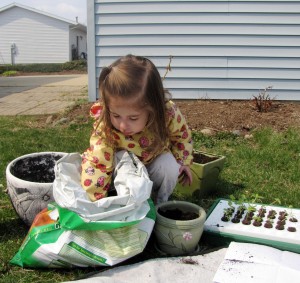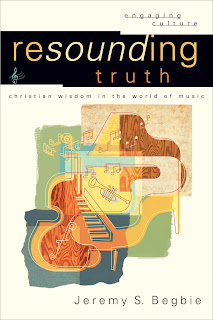May we continue the conversation?
 If our daily lives are to be centered around Christ, if we are to build physical reminders of Jesus into our daily routines, if all that we are and all that we do is to be made sacred, then how does that idea expand to include the world around us? Is the world around us, the culture in which we live, also to be made sacred?
If our daily lives are to be centered around Christ, if we are to build physical reminders of Jesus into our daily routines, if all that we are and all that we do is to be made sacred, then how does that idea expand to include the world around us? Is the world around us, the culture in which we live, also to be made sacred?
I read “Resounding Truth” and ponder this:
This book is concerned with…gaining theological discernment about music…It is concerned with how God’s truth might “sound” and “re-sound” in the world of music.
My mind begins to whirl. Should I attempt to view music through a godly perspective? Even purely instrumental music? If in this, than in what other realms should we have a godly worldview?
Literature? Politics? Art? Philosophy? Science? Technology?
Should everything be interpreted through a God-window?
I suppose that there is nothing outside of the lordship of Jesus.
I think through this a little more.
Are we asked to view everything in our world through a godly framework? Are we called by God to actively think through issues in our world, to read and listen, pray and ponder the things in our culture that are relevant in the world?
It would certainly be easier to stay focused only on my home, my daily routine.
Easier, however, is not generally what God calls us to pursue.
Paul says in Colossions 3.17:
And whatever you do, whether in word or deed, do it all in the name of the Lord Jesus, giving thanks for God the Father through Him.
Whatever you do. This certainly reinforces my thoughts about consciously bringing God into my daily life. This doesn’t, however, necessarily translate to God asking us to actively pursue an understanding of and engagement with our culture.
I continue to wonder and seek God in this as I move through my day.
I sit at the computer and see that I have received my Mars Hill Audio Journal in my in-box.
 Mars Hill’s stated purpose is to help Christians thoughtfully engage their culture.
Mars Hill’s stated purpose is to help Christians thoughtfully engage their culture.
They make the argument (rightfully, I believe) that a layer of “Love your neighbor as yourself” is to
pay careful attention to the neighborhood: that is, every sphere of human life where God is either glorified or despised, where neighbors are either edified or undermined. Therefore, living as disciples of Christ pertains not just to prayer, evangelism, and Bible study, but also our enjoyment of literature and music, our use of tools and machines, our eating and drinking, our views on government and economics, and so on.
Considering a godly perspective on technology and economics is a newer idea for me.
Paul certainly engaged the culture when he spent time in the marketplace in Athens, listening to and speaking with the philosophers of the day. (Acts 17)
As artists, my friend Kati and I have discussed this issue from the perspective of making quality art and engaging the artistic community where they are in order that art may be pervaded by Christ.
Should there be any realm of human endeavor that is not pervaded by Christ?
The host of Mars Hill says it this way:
But it is nonetheless imperative for us to be active in the culture, not because we are saved, but because we are created. Pursuing an understanding of and engagement with our culture is necessary for Christians because we must first bow to God as Creator, to thank him for the goodness that remains in his fallen creation, to live creatively, that is, in keeping with the patterns and norms he has established for creation, even as we eagerly await the advent of a new creation.
Meanwhile, life in this created sphere has meaning and value. God bestows blessings even on the unrighteous. He gives wonderful talents and abilities to those who hate the mention of his name. These blessings are what we mean by common grace: the gratuitous gifts to the just and the unjust that sustain and enrich the life shared by the wheat and the tares.
C.S. Lewis also argues that God asks us to bring Him into all branches of human thought:
If all the world were Christian, it might not matter if all the world were uneducated. But, as it is, a cultural life will exist outside the church whether it exists inside or not. To be ignorant and simple now–not to be able to meet the enemies on their own ground–would be to throw down our weapons, and to betray our uneducated brethren who have, under God, no defense but us against the intellectual attacks of the heathen. Good philosophy must exist, if for no other reason, because bad philosophy needs to be answered. The cool intellect must work not only against cool intellect on the other side, but against the muddy heathen mysticisms which deny intellect altogether.
I must conclude that God does, indeed, ask us to actively pursue an understanding of and engagement with our culture. As I pursue this idea of holistic living, of considering everything to be made sacred, I must go beyond the walls of my home, beyond the walls of my church.
I will keep reading and listening, praying and pondering.
 Will you continue the conversation?
Will you continue the conversation?
If you want a bit of Further Reading on this, here are two essays:
Christianity, Culture and Modern Grace
Christianity and Culture


